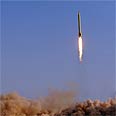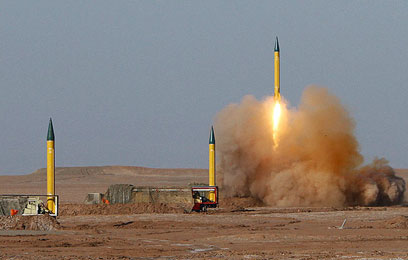
Official: Hezbollah attack more dangerous than Iran missiles
In wake of ongoing debate over possible Israeli attack on Iran, security assessments indicate that biggest threat to Israel is not Islamic Republic's missiles but rather Hezbollah's ability to fire rockets at Israel
The continuous debate over a possible attack on Iran's nuclear facilities has sparked further discussion about the major security threats Israel currently faces.
While senior security establishment officials vehemently warn against the ramifications of a military strike on Iran's nuclear facilities, security and government assessments indicate that the biggest threat to Israel is a deadly response from Iran's ally Hezbollah, whose leader Hassan Nasrallah has previously warned that its missiles and rockets could strike anywhere inside the Jewish state.
Relates stories:
A government source said that "Hezbollah is the long arm of Iran," adding that "this terrorist organization will undoubtedly barrage Israel with thousands of missiles. It won't begin with Kiryat Shmona and end in Haifa, but will reach further into Israel. Hezbollah could cover Israel with rockets."
According to additional assessments, Hezbollah has acquired medium-long range Scud missiles. However, IDF sources have asserted that it holds a significant list of targets which will enable the Israeli Air Force to hit long-range missile launch pads.
"In the event of a Hezbollah attack, there is no doubt that one of the first missions will be to destroy Hezbollah's long-range missile launch pads, just as we did during the Second Lebanon War," said an official source.

Iran has 300-400 Shahab missiles
When asked why Israel has yet to launch a preemptive strike on the targets, the source said that "a preemptive attack means instigating war. We can't constantly be in a state of endless fighting."
Security establishment officials estimate that Iran has between 300 and 400 Shahab-3 ground missiles that it can fire at Israel. However, if the Islamic Republic does decide to fire missiles at Israel, it would most likely not use its entire missile arsenal.
In recent years, Israel has accelerated the development of the Arrow missile defense system, designed to thwart long-range missiles in a US-backed "race" against Iran, Syria and other regional enemies, a senior Israeli defense official said on Sunday.
"The accuracy and the reach will be greater," the official said of Arrow, which has been operational since 2000 and is designed to blow up incoming missiles at altitudes high enough for non-conventional warheads to disintegrate safely.
In parallel with Arrow II, Israel is developing Arrow III, which is due to be operational in 2014 or 2015. Unlike previous generations of the interceptor, Arrow III will engage incoming missiles in space, using detachable warheads that, turning into "kamikaze" satellites, will seek out and slam into the target.
"The recent developments indicate that Israel has the means to handle a missile attack from Iran or from the Gaza Strip. The major problem Israel currently faces is the significant missile arsenal the Hezbollah holds and its ability to fire rockets at Israel for a long period of time," said the official source.
Defense Ministry experts have estimated that in a war with Iran and Hezbollah, some 300 Israeli civilians will die. The forecasts are based on the number of missiles and rockets the enemy has, data accumulated in the wake of previous wars, and preparedness in the Israeli home front.
- Receive Ynetnews updates directly to your desktop










